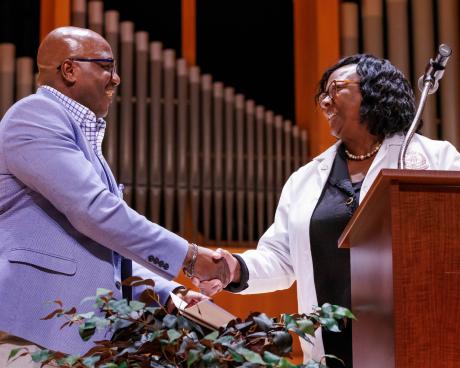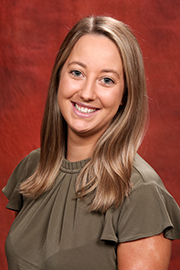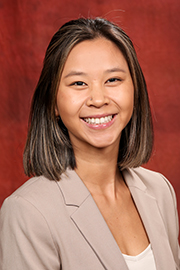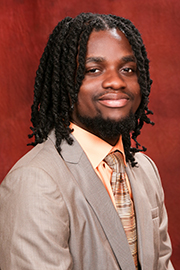PA Class of 2025 celebrates milestone by donning White Coats


The Florida State University College of Medicine’s Physician Assistant Class of 2025 celebrated successfully completing its first semester in a traditional White Coat Ceremony Friday, Jan. 19, at Opperman Music Hall in front of family and friends.
Interim Dean Alma Littles, M.D., reminded the 58 participating students that she had welcomed them to this new chapter in their lives just 22 weeks earlier.
“Your talents and varied experiences were the reason you were chosen to join the Class of 2025, but undoubtedly there were some anxious moments as you prepared to tackle the challenges ahead,” she said.
Those challenges included Gross and Radiographic Anatomy, Essentials of PA Practice, Integrated Clinical Science, Evidence Based Practice, Physiology, Pharmacology and Nutrition – and that was just the first semester, followed by exam week just before the holiday break.
“My hope is that each of you had the opportunity to recover during the holiday and reflect on what you learned and accomplished along the way,” she said. “What you should have discovered is that you belong here in our PA school and you have what it takes to succeed.”
The class of 2025 is the seventh admitted since the School of Physician Assistant Practice was created. Five classes have completed the 27-month program and produced 255 graduates, with 80% practicing in Florida and 31% serving in a primary care field. This “directly and positively impacts the well-documented shortage of health-care providers in our state,” Littles said.
“Today’s ceremony is all about acknowledging the significant transition in your professional life as you get ready to care for patients in your future training,” she continued. “The white coat, along with the stethoscope, is one of the most recognizable symbols in medicine. While you should wear it with great pride, you must recognize that with this symbol comes great responsibility.”
Class of 2025 President Mary Beth Brown introduced the keynote speaker, Folusho Ogunfiditimi, president and chair of the board of directors of the American Academy of Physician Associates (AAPA), as PAs are now often called.
With 23 years of administrative and clinical experience, serving as both a health-care administrator and a practicing PA in urology, Ogunfiditimi was born in the United States but his parents moved the family back to Nigeria shortly after his birth. There, he experienced firsthand how challenging it can be to access high-quality health care. When he was 7, he became very sick and was diagnosed with typhoid fever, a bacterial disease often fatal to children.
“I needed fluids and antibiotics,” he said. “The health-care provider worked for what seemed like hours to find a vein for an IV. I remember my mom sitting next to the bed sobbing.
“Finally, he inserted the needle into a vein in my temple. It worked. Soon the life-saving medicine and fluids were flowing. Rather than giving up, this provider used his knowledge, innovation and pure determination to save me. It was at that moment that I knew I would go into medicine.”
After the family returned the U.S., he joined the U.S. Army as a medic and was mentored by a PA in the infantry. Upon completion of his military commitment, he completed the PA program at Howard University and worked in urology. He also earned a master’s in public health and a doctorate in organizational leadership and shifted from clinic care to health-care administration.
Currently, he is the administrator of practice management at Daytona Beach-based Florida Health Care Plans, where he oversees clinical operations of 23 ambulatory multi-specialty practices and one ambulatory surgery center in five counties.
In addition to sharing his personal inspiration for going into medicine, Ogunfiditimi described the growth and acceptance of the PA profession, which graduated its first class in 1965.
“We have made leaps and bounds just in my lifetime,” he said. “I remember that when I graduated from PA school, very few states allowed PAs to prescribe medicines for their patients. But by 2007, every state in the U.S. had updated its laws so that PAs could prescribe the medications their patients needed.”
Today, there are more than 168,300 PAs working across all medical and surgical specialties and in every U.S. state and territory.
“Most importantly,” Ogunfiditimi said, “PAs have 500 million patient interactions annually.”
Saying the next two years will be challenging – “I’m not even going to joke about that” – he offered words of encouragement and urged the PA students to embrace the cases they experience, whether they’re mundane or complex.
“All of them matter in your development as a clinician. When you feel self-doubt, remember what sparked your interest in becoming a PA,” he said. “That is what you can tap into. Use it to clear your hurdles and power forward.”
Citing the three Ps – Patients, Practice and Professionalism – Ogunfiditimi said the patients should be every PA’s “North Star.”
“Your job is to meet them where they are and help them navigate the often-confusing health-care system.”
“Best of luck!” he concluded. “I look forward to calling all of you my colleagues.”
After faculty had helped PA students, gathered in groups of four on stage, into their white coats, family and friends followed the recessional of students and faculty to steps outside Opperman to offer congratulations.
A sampling of student reactions
Sina Kipry

Sina Kipry was born in Germany to German parents; the family immigrated to Virginia, where she grew up.
Her mother, Gaby Kipry, now lives in Fort Myers. Sina’s high school sweetheart and husband of 12 years, Ben Golden, stayed at their home in Pensacola when she moved to Tallahassee for her first 15 months of coursework. She’s hoping to complete her clinical rotations at the Pensacola Regional Campus.
“I’m overwhelmed but in a good way,” she said after the White Coat Ceremony.
An anthropology major at James Madison University, she earned a masters in anthropology at the University of West Florida and worked in the field of forensics while pursuing a career in forensic pathology. She took a job as a patient-care technician to gain hands-on patient experience and her focus began to shift. The more she learned about the PA profession, the more she realized it was right for her.
“I’m 31, so it took me a little longer to get where I’m supposed to be,” she said.
Her father, Bernd Kipry, passed away three years ago. “I know it’s hard for her not to have him here,” her mother said as Sina filed past her and Ben in the recessional.
Once outside, Sina placed her hand over her heart and said, “I wish he were here, but I know he’s always here with me.”
Saejin Confusione
Saejin Confusione has known for the past five years that she wanted to be a PA.

“I want the work/life balance,” she said. “I’m feeling great, very excited.”
She’s thinking she’ll enter into primary care but acknowledged things could change.
From Jacksonville, she majored in Human Development and Family Science at FSU, she also met her husband, Caleb Confucione, during undergraduate school.
“I’m very proud of her,” he said. “I’ve seen all the hard work.”
Her parents, Tracy and Harry Albright, echoed feelings of pride in her accomplishments, as did other relatives.
“I got a little misty-eyed,” Dad said. “And I have to say, that kind of thing didn’t happen until I turned 40.”
Alex Jeantinor

North Miami Beach native Alex Jeantinor was a sophomore majoring in Health Science with a minor in Public Health at the University of Florida when he decided to become a PA.
In his student profile for the College of Medicine website, Jeantinor wrote that he hopes to bridge the gap between members of the Black and Caribbean communities and health-care providers in the United States.
“Growing up, I was surrounded by peers who did not seek health care for a variety of reasons, including the negative experiences of their parents with providers who did not seek to understand them,” he said.
Being a PA will allow him to maximize his patient interactions and help fight medical racism.
Girlfriend Riccia Holder, a newly graduated registered nurse at Tallahassee Memorial HealthCare, was there to show her support and present two bouquets of roses.
Contact Audrey Post at audrey.post@med.fsu.edu
Photo Captions:
Spotlight photo on Home page:
Geetha Velusamy, left, is helped into her white coat by Kimberly Berggren, DMSc, PA-C. Waiting their turns are Megan Vilaseca, second from left, and Wendy Doyle-Langley, PA-C, RRT; Francheska Villanueva and Anthony Speights, M.D., senior associate dean for Interdisciplinary Medical Sciences and director of the Bridge to Clinical Medicine masters program; and Lindsay Weaver and James Cawley, MPH, PA-C, DHL.
Photo at top right:
College of Medicine Interim Dean Alma Littles, M.D., thanks Folusho Ogunfiditimi, president and chair of the American Academy of Physician Associates, for delivering the keynote speech at the Class of 2025 White Coat Ceremony.
(Photos by Colin Hackley for the FSU College of Medicine)

